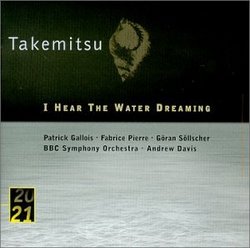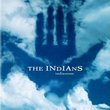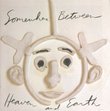| All Artists: Toru Takemitsu, Sir Andrew Davis, BBC Symphony Orchestra Title: Takemitsu: I Hear the Water Dreaming Members Wishing: 0 Total Copies: 0 Label: Deutsche Grammophon Original Release Date: 1/1/2000 Re-Release Date: 6/13/2000 Genre: Classical Styles: Chamber Music, Forms & Genres, Concertos, Instruments, Reeds & Winds, Symphonies Number of Discs: 1 SwapaCD Credits: 1 UPC: 028945345925 |
Search - Toru Takemitsu, Sir Andrew Davis, BBC Symphony Orchestra :: Takemitsu: I Hear the Water Dreaming
 | Toru Takemitsu, Sir Andrew Davis, BBC Symphony Orchestra Takemitsu: I Hear the Water Dreaming Genre: Classical
Takemitsu, who died in 1996, wrote everything from movie music to Beatles arrangements to avant-garde chamber music. In his best works, he draws simultaneously on the traditional idiom of Japan and the most advanced contem... more » |
Larger Image |
CD DetailsSynopsis
Amazon.com Takemitsu, who died in 1996, wrote everything from movie music to Beatles arrangements to avant-garde chamber music. In his best works, he draws simultaneously on the traditional idiom of Japan and the most advanced contemporary techniques. All this music was written (or, in one case, arranged) for flute solo, and Patrick Gallois proves a most satisfying interpreter, getting into the composer's skin and playing with a most convincing sense of inner quiet. One misconceived idea mars the disc, though. Takemitsu had good reasons for producing three versions of Toward the Sea, a lovely and imaginative piece. But even when separated by other pieces, they don't make for satisfying listening on one program. (Given the choice, I would have picked the orchestral version for its added color.) Still, with such fine performances and sound, there's enough music on the disc to make it worth picking up if the idiom appeals to you. --Leslie Gerber Similarly Requested CDs
|
CD ReviewsZen Debussy Ed Brickell | 07/21/2000 (4 out of 5 stars) "Sparse, often quiet and highly impressionistic, Takemitsu reminds me of Debussy in his skill at orchestral color and his ability to evoke strong images through sound. On this recording Patrick Gallois' lovely flute playing is the star of the show, weaving a strongly meditative mood in the seven pieces here (all 13 minutes or less). Takemitsu's mastery of the orchestra isn't immediately apparent because he used the (at times) huge ensembles he wrote for so sparingly, but his subtlties do indeed hold up to repeated listening. Still, less is definitely more in the world of Takemitsu, and those used to strong western-style musical discourse may find it lacking in substance at first. I for one have listened to his compositions many times and for me, it is always an interesting experience.Recommended for those looking for a softer, quieter, but still genuinely musical experience in contemporary "classical" music." Great for newcomers Wyote | Seoul | 07/15/2006 (5 out of 5 stars) "Sometimes I encounter opinionated people who believe that modern art music as a whole stinks. Other times I find someone interested in the subject, but too nervous to experiment with George Crumb or John Cage or even Schoenberg. These are not the kind of people who would approvingly compare Takemitsu to Debussy or Messiaen. But these are precisely the kind of people to whom I introduce Takemitsu, confident that his beautiful music will seduce them if they approach it with an open spirit. You do not require an education in music theory to appreciate this; in fact, you might be better off without one. Just listen closely. As for me, I am far from an expert in music, but Takemitsu is definitely among my favorites. I love "From Me Flows What You Call Time" best of all his work, and I would offer it to you ahead of the music on this CD, although this is probably more approachable just because it is a little less percussive, though no less rythmically startling. Like all of Takemitsu's music that I've heard, this music is very peaceful on the surface, with quickly passing moments of conflict--though repeated listening reveals more and more subdued tension to me. Takemitsu teaches me not merely to wait patienty for the music, but to appreciate the silence as attentively as the sound. Simple sounds in Takemitsu's music sometimes seem so intense, silence is required as a balance, sometimes even a relief. And then, harmony comes as a kind of sweet delight that would be unbearable in abundance. At first his music made me feel a contrast between woodwind and string; but more and more I find myself experiencing them as a single, inseparable sound in his music, as if they came from a single instrument. So far, no other composer's music has had that effect on the way I experience the instruments. Forgive me for leaping so far, but it reminds me of some very enjoyable jazz. This particular CD is interesting because it has three variations of the same piece of music, as Takemitsu modified it over an 8 year period. The opportunity to contrast them makes for a unique musical experience, which some people will enjoy greatly. Just FYI, for my fellow humble dabblers in the musical world, some other modern composers whose work I find easy to enjoy include Arvo Part, Philip Glass, and George Enescu--not to mention the stars, Shostakovich, Holst, and Orff. Messiaen I have found more challenging, though I am unfamiliar with most of his work. As for Debussy, mentioned by all the reviewers here, you should definitely not miss his "Prelude a l'apres-midi d'un faun." No one will fail to perceive Takemitsu's debt, but it's very pleasant to move from Debussy's lush sensuality to Takemitsu's gentle beatitude." See the Toward catherine guelph | milano, italy | 10/28/2000 (3 out of 5 stars) "I enjoy the quiet, expressive music on this CD. It is music for flute (Patrick Gallois) and orchestra, influenced by French impressionism of the late nineteenth century. LE FILS DES ETOILES is adapted from Erik Satie. The music elevates silence to an importance equal with sound. Just as there can be no wave without a trough, there can be no sound without silence. I am reminded of waves by the undulating melodies of the flute accompanied by guitar in TOWARD THE SEA (I). Takemitsu-sensei (1930-1996) was a prolific composer, who was largely self-taught. He composed scores for 93 films in his forty year career. Among the distinguished directors he has worked with are, Kurosawa, Teshigahara, Imamura, Shinoda and Oshima. By way of an incomplete example, some of the esteemed films he has been involved with are Kuroi Ami (Black Rain 1989), Ran (1985), Ai no borei (L' Empire de la Passion 1978), Dodesukaden (1970), and Suna no onna (Woman in the Dunes 1964). If you are interested in the artistry of one of Japan's most reknowned composers, or if you are interested in quiet, flute music, this CD will interest you."
|

 Track Listings (13) - Disc #1
Track Listings (13) - Disc #1



